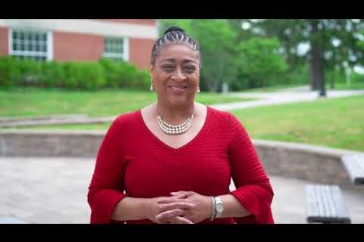
It’s the first meeting of the Student Armed Forces Association and a handful of student veterans are gathered in a small suite on the third floor of Thompson Hall. Doug Rodoski ’16 sits in an overstuffed chair, his feet extended toward a small coffee table trunk decorated with American flags. A few feet away, Zechariah Anderson ’19 is settled into a matching chair. Anderson’s service dog, a yellow lab named Dexter, rests his chin on Anderson’s knee.
Until recently, the 280-plus student veterans, guardsmen and reservists attending UNH didn’t have a place of their own where they could gather and be among people who shared a similar past or present. In fact, until 2010, there was no actual office of military and veterans’ services on the Durham campus. Veterans’ coordinator Lonn Sattler worked out of the registrar’s office in Stoke Hall, where, for nearly 30 years, he and a handful of students guided former and current student soldiers through the college process.

In November 2015, the UNH Military & Veterans Services (MVS) set up in an office on the third floor of Thompson Hall. In April, the space was expanded to add a veteran-student lounge outfitted with a donated television, coffeemaker and refrigerator.
And it’s not just the physical space — the new MVS office is also fully staffed. Karen Gilbert started working there part-time in 2011 and became the full-time director in 2015. Denny Byrne, part-time support specialist, was hired in 2013, and Katie Romero, assistant veterans coordinator, joined the team in 2015. Together with Sattler, they help students understand what benefits are available and how to get them.
“A lot of students don’t know what they’re eligible for or how to use what they have,” Gilbert says. Many students, for example, think they can’t submit the Free Application for Federal Student Aid because they’re on the GI Bill. “Some don’t understand that we’re not the ones who issue benefits; once they have a certificate of eligibility, we can put things into action.”
“Following up makes a difference. Helping them meet others, getting to know their environment — it’s about keeping the connection alive.”
Entering students learned all of this and more during VET Connect, a pre-orientation program just for veterans, guardsmen and reservists that this year took place Aug. 24–25. The program included a tour of campus and an introduction to services such as the Center for Academic Resources, Disability Services for Students and Information Technology.
Sattler says VET Connect “makes them a group instead of just individuals. Since we have staff, that’s a growing piece of what we can do — we get to spend more time with them, help them make connections and feel like they fit in.”
That doesn’t come easily for everyone. Many of UNH’s veterans are first-generation students for whom college wasn’t part of the conversation when they were younger. Sattler says there can be a sense of feeling apart, especially for those who have been to war.
“One out of three combat veterans has a traumatic brain injury and/or PTSD, causing them to struggle academically in areas where they used to excel,” he explains. “They lose hope. We tell them the GI Bill pays for tutors and try to make sure they know they are not alone, that there are other people here like them.”
Gilbert notes that before, she and Sattler only had the capacity to help these students address financial issues. The expanded programming is better. “Following up makes a difference. Helping them meet others, getting to know their environment — it’s about keeping the connection alive.”
?
Originally published in?UNH Magazine Winter?2017?Issue
?
-
Written By:
Jody Record ’95 | Communications and Public Affairs | jody.record@unh.edu




















































